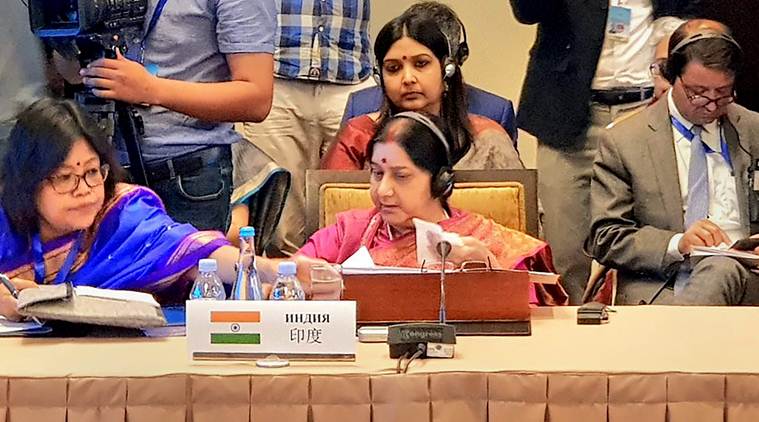- India
- International
New Delhi signals shift: From Afghan-led process to any process for peace
China and Russia have also hosted peace talks with Taliban representatives. Khalilzad recently briefed India — the third time in five months — and Chinese and Russian interlocutors have also engaged with Delhi on this issue.
 External Affairs Minister Sushma Swaraj delivers her statement at Shanghai Cooperation Organisation (SCO) Council of Foreign Ministers in Bishkek. (PTI Photo)
External Affairs Minister Sushma Swaraj delivers her statement at Shanghai Cooperation Organisation (SCO) Council of Foreign Ministers in Bishkek. (PTI Photo)
In a departure from the stated Indian position in recent years, External Affairs Minister Sushma Swaraj told the Shanghai Cooperation Organisation (SCO) Wednesday that “India stands committed to any process, which can help Afghanistan emerge as a united, peaceful, secure, stable, inclusive and economically vibrant nation, with guaranteed gender and human rights”.
Swaraj made the statement at the SCO’s foreign minister-level meeting in Bishkek, Kyrgyz Republic. This is a shift from India’s stand of supporting an “Afghan-led, Afghan-owned, and Afghan-controlled” process, with the participation of the Government of Afghanistan.
This change comes in the wake of negotiations that US envoy on Afghanistan reconciliation, Zalmay Khalilzad, has had with the Taliban since 2018.
China and Russia have also hosted peace talks with Taliban representatives. Khalilzad recently briefed India — the third time in five months — and Chinese and Russian interlocutors have also engaged with Delhi on this issue. The departure in India’s position gives credence to processes led by all these international players, which were not seen as an Afghan-led and Afghan-owned process by Delhi earlier. It will be important to see how Kabul sees Delhi’s shift, as US prepares for troop withdrawal from Afghanistan.
On November 9, 2018, when India participated at the meeting on Afghanistan hosted by Russia through its non-official representative, the official spokesperson for the Ministry of External Affairs, Raveesh Kumar, had said, “India supports all efforts at peace and reconciliation in Afghanistan that will preserve unity and plurality, and bring security, stability and prosperity to the country. India’s consistent policy has been that such efforts should be Afghan-led, Afghan-owned, and Afghan-controlled and with participation of the Government of Afghanistan.”
India had sent two highly experienced former diplomats, Amar Sinha, former Ambassador to Afghanistan (2013 to 2016), and T C A Raghavan, former Indian High Commissioner to Pakistan (2013 to 2015), as its “non official” participants, to the Moscow format meeting. This was the first time that Indian government-nominated representatives were sharing a table with a Taliban delegation. While India’s participation at the Moscow format was the first such occasion to sit with the Taliban in a multilateral meeting, it was perceived as a shift in its position.

But India’s position has evolved over the years. Its approach towards the Taliban had not been favourable — it was one of the countries that did not recognise the Taliban regime in Kabul between 1996 and 2001. After the fall of the Soviet-backed Najibullah government in 1992, as the Taliban first emerged on the scene, India had watched their rise with fair amount of concern.
The only time they were forced to engage the Taliban was when Indian Airlines flight IC-814 was hijacked to Kandahar in December 1999. After about five years of being on the run following the 9/11 attacks in 2001, the Taliban re-emerged in 2006-07, once again challenging US forces with suicide attacks.
India maintained that it was not going to talk to the Taliban, as it stood against these forces which were a threat to peace and security in the region, especially since they were backed by Pakistan’s establishment.
At the London conference in 2010, India made a quiet but significant shift when it played along the “red lines” for engaging with the Taliban. New Delhi said it was for the elected government of Afghanistan to draw the “red lines” or lay down the terms and conditions for negotiating with the Taliban.
The Afghan government had stated that the “Taliban must accept the Afghan Constitution, renounce violence and sever all ties with al Qaeda and other terrorist organisations”. These three pre-conditions for an Afghan-led peace and reintegration programme were endorsed during the London conference.
That shift of finally talking to the Taliban was the first diplomatic opening. Although New Delhi would not directly talk to the Taliban, this shift in stance meant that India was approving the outreach to the Taliban who adhered to these red lines.
Over the last couple of years, as the US, China and Russia brokered reconciliation and peace talks between the Afghan government and the Taliban, New Delhi made another quiet shift. It stopped public articulation and insisting on the three “red lines”, and said the peace process should be “Afghan-led” and “Afghan-owned”.
Apr 24: Latest News
- 01
- 02
- 03
- 04
- 05







































